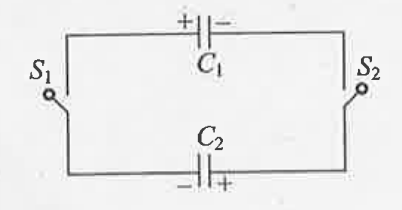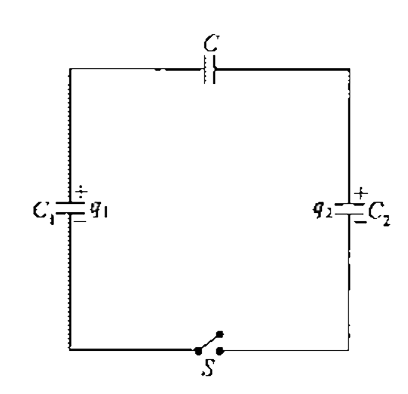Two capacitors C1=2mFandC2=8mF are seperately charged from the same battery. These two capacitors are then allowed to discharge separately through resistors of same resistance with a switch in series which are kept open initially. Both switches are closed at t = 0.
Current at t = 0 will be zero in both the capacitors.
At t = 0 current in C1 will be 4 times the current in C2.
At t = 0 current in both the capacitors will be the same
Capacitor C1 loses 25% of its initial charge in lesser time than capacitor C2.
The correct Answer is:C, D
current in discharging circuit is given as i=i0e−t/τ, where i0=V/R. Both the capacitors were charged to the same potential difference and allowed to discharge through the same resistance. So, the magnitude of initial currnent in both the cases must be same and of course it will be non-zero. Thus, option (c) is correct. Further, time constant of the discharging circuit is given by the product of capacitance and resistance of the circuit. Here, resistance is same for both but C1 is smaller and hence time constant for the discharging of C1 is smaller. Discharging of C1 will be faster, thus, option (d) is correct.
Topper's Solved these Questions
- BOOK - MODERN PUBLICATIONCHAPTER - CURRENT ELECTRICITYEXERCISE - Objective Type Questions (MULTIPLE CHOICE QUESTIONS) (D. MULTIPLE CHOICE QUESTIONS BASED ON A GIVEN PASSAGE/COMPREHENSION)15videos
CURRENT ELECTRICITY
- BOOK - MODERN PUBLICATIONCHAPTER - CURRENT ELECTRICITYEXERCISE - Objective Type Questions (MULTIPLE CHOICE QUESTIONS) (D. MULTIPLE CHOICE QUESTIONS ASSERTION REASON TYPE QUESTIONS)10videos
CURRENT ELECTRICITY
- BOOK - MODERN PUBLICATIONCHAPTER - CURRENT ELECTRICITYEXERCISE - Objective Type Questions (MULTIPLE CHOICE QUESTIONS) (B. MULTIPLE CHOICE QUESTION JEE (ADVANCED) FOR IIT ENTRANCE)9videos
CURRENT ELECTRICITY
- BOOK - MODERN PUBLICATIONCHAPTER - ATOMS EXERCISE - Chapter Practice Test16videos
ATOMS
- BOOK - MODERN PUBLICATIONCHAPTER - DUAL NATURE OF RADIATION AND MATTER EXERCISE - CHAPTER PRACTICE TEST15videos
DUAL NATURE OF RADIATION AND MATTER
Similar Questions
A capacitor C1 of capacitance 1μF and a capacitor C2 of capacitance 2μF are separately charged by a common battery for a long time. The two capacitors are then separately discharged through equal resistors. Both the discharge circuits are connected at t=0.
View SolutionA capacitor of capacitance 500(μ)Fis connected to a battery through a (10k(Ω)) resistor.The charge stored on the capacitance 2(μ)F are separately charged by a common battery for a long time. The two capacitors are then separately discharged through equal resistors.Both the discharge circuits are connected at t=0.
View Solution
Knowledge Check
- Question 1 - Select One or More
Capacitors C1=1μF and C2=2μF are separately charged from the same battery. They are allowed to discharge separately through equal resistors
AThe currents in the two dicharging circuits at t=0 is zeroBThe currents in the two discharging circuits at t=0 are equal but not zeroCThe currents in the two discharging circuits at t=0 are unequalDC1 loses 50% of its initial charge sooner than C20 loses 50% of its initial charge. - Question 2 - Select One
Capacitor C1 of the capacitance 1μF and another capacitor C2 of capacitance 2μF are separately charged fully by a common battery.The two capacitors are then separately allowed to discharge through equal resistors at time t=0.
AAt t = 0 the value of current in the circuit containing 1μF is more than current in the circuit containing 2μFBAt t = 0 the current in 2μF capacitor circuit is more than current in 1μF capacitor circuitC1μF capacitor losses 50 % charge sooner than 2μF capacitorD2μF capacitor losses 50 % charge sooner than 1μF capacitor - Question 3 - Select One or More
Capacitor C1 of the capacitance 1μF and another capacitor C2 of capacitance 2μF are separately charged fully by a common battery.The two capacitors are then separately allowed to discharge through equal resistors at time t=0.
AThe current in each of the two discharging circuits is zero at t=0BThe current in the two discharging circuits at t=0 are equal but not zeroCThe currents in the two discharging circuits at t=0 are unequalDCapacitor C1 loses 50% of its initial charge sooner than C2 loses 50% of its initial charge
Two capacitors C1andC2(C1>C2) are charged separtately to same potential. Now they are allowed to discharge through similar resistors. Initial rate of discharging will be
View SolutionCapacitor C1 of capacitance 1 micro-farad and capacitor C2 of capacitance 2 microfarad are separately charged fully by a common battery. The two capacitors are then separately allowed to discharged through equal resistors at time t = 0.
View SolutionA charged capacitor of capacitance C is discharging through a resistor of resistance R. At what time the charge on the capacitor is equal to one half of its initial value?
View SolutionTwo capacitors C1andC2 are charged to the same potential V, but with opposite polarity as shown in the figure. The switch S1andS2 are then closed.
 View Solution
View SolutionTwo capacitor C1 and C2, charged with chargesq1 and q2 then these are connected in series with an uncharged capacitor C, as shown in figure. As the switch S is closed :
 View Solution
View Solution
